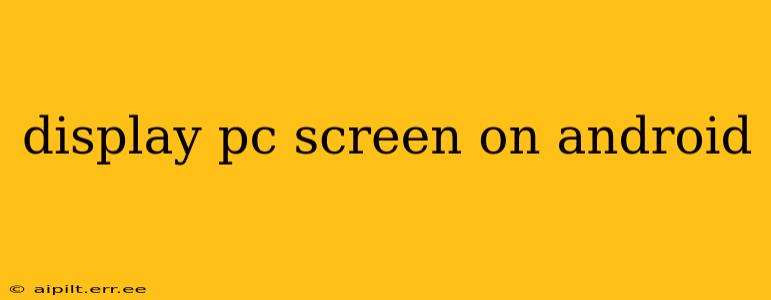Want to mirror your PC screen onto your Android device? Whether you're giving a presentation, streaming games, or simply want a more convenient way to access your computer, there are several ways to achieve this. This guide explores the various methods, their pros and cons, and answers frequently asked questions to help you find the best solution.
What are the Different Ways to Display My PC Screen on Android?
There are several methods to mirror your PC screen to your Android phone or tablet, each with its own strengths and weaknesses. The best option for you will depend on your technical skills, budget, and specific needs.
1. Using a Wireless Display Adapter:
This is a popular and often straightforward method. Many wireless display adapters are available, allowing you to connect your PC to your Android device via Wi-Fi. This often provides a good quality connection. However, you'll need to purchase an additional piece of hardware. Setup can vary depending on the specific adapter.
Pros: Generally good image quality, relatively easy setup for some adapters.
Cons: Requires purchasing additional hardware, potential for lag depending on network conditions and adapter quality, not always compatible with all Android devices or PC operating systems.
2. Using a Third-Party App:
Several apps are available on the Google Play Store that offer screen mirroring functionality. These apps generally use Wi-Fi or a local network to connect your PC and Android device. Some apps offer additional features like remote control capabilities.
Pros: Can be a cost-effective solution, often offers additional features.
Cons: May require you to install software on your PC, potential security risks associated with third-party apps, potential for lag and instability, compatibility issues can occur.
3. Using Chromecast with a compatible application:
If your PC is running a compatible app (like YouTube or Netflix), you can use your Chromecast to cast its content to your Android device. This isn't true screen mirroring, but it's a useful solution for specific applications.
Pros: Easy setup if you already own a Chromecast, good image and audio quality when using compatible apps.
Cons: Doesn't offer true screen mirroring; only works with compatible apps.
4. Using Windows' built-in screen mirroring feature (Miracast):
If your PC and Android device support Miracast, you may be able to mirror your screen wirelessly. Check your PC and Android device specifications to see if they support Miracast.
Pros: No need for additional apps or hardware (if both devices support it).
Cons: Not all devices support Miracast, can be unreliable, may experience lag and connection issues.
How Do I Choose the Right Method for My Needs?
Choosing the right method depends on several factors:
- Budget: Wireless adapters are the most expensive option, while using a third-party app is often the cheapest.
- Technical Skills: Some methods require more technical expertise than others.
- Compatibility: Ensure your PC and Android device are compatible with the chosen method.
- Reliability: Wireless methods can be more prone to lag and connection issues.
- Security: Be mindful of the security implications of using third-party apps.
What are the potential problems with displaying my PC screen on Android?
Several issues can arise when trying to mirror your PC screen to your Android device:
H2: Why is my screen mirroring lagging?
Lag is a common problem with wireless screen mirroring. It can be caused by several factors, including network congestion, weak Wi-Fi signal, insufficient bandwidth, or limitations of the hardware or software being used.
H2: Why isn't my PC showing up on my Android device?
Several factors could prevent your PC from appearing on your Android device: The devices might not be on the same network, there could be compatibility issues, firewalls may be blocking the connection, the necessary software or drivers may not be installed, or the Miracast/screen mirroring function might be disabled.
H2: What security risks are there?
Using third-party apps for screen mirroring carries security risks. It's crucial to download apps only from reputable sources and carefully review app permissions. Ensure the app is well-reviewed and updated regularly to minimize potential vulnerabilities.
Conclusion:
Displaying your PC screen on Android offers a range of benefits, from presentations to gaming. By carefully considering the methods and potential challenges outlined above, you can choose the best solution to suit your needs and enjoy seamless screen mirroring. Remember to prioritize security and compatibility for a smooth and secure experience.
